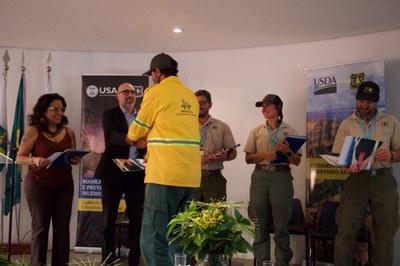Training on the Use of Essential Equipment to Respond to Forest Fires
July, 2024 – From July 2 to 9, around 35 firefighters and civil servants attended two training programs at the Brasilia Botanical Gardens: S-212—Chainsaws for Forest Firefighting; and S-211—Motor Pumps for Forest Firefighting.
The United States Forest Service (USFS), working in partnership with USAID, delivered the second edition of these courses to strengthen safety and effectiveness when responding to wildfires. Three instructors traveled from the United States to deliver the classes, and former students were invited to act as mentors for new ones.
“It’s great to be able to share knowledge and feel like we are contributing to a greater goal. We also learned a lot because many techniques are used here that we do not use in the United States. So, we can take advantage of that and incorporate those techniques into our work,” said Chris Ives, one of the instructors who is part of the Interagency Hotshot Fire Brigade in Flagstaff, Arizona.
This training initiative is part of the Forest Management and Fire Prevention Program in Brazil, run by the USFS with the support of USAID in partnership with the National Indigenous Peoples Foundation (FUNAI) and the National Center for Prevention and Combat of Forest Fires (PrevFogo ), linked to the Brazilian Institute of the Environment and Renewable Natural Resources (IBAMA).
For Querlandia Pereira, a firefighter in Cavalcante, in the state of Goiás, participating in the course was important to bring security to her work in the field. “I learned a lot. There was a lot of teamwork and communication, and we learned through that. Regarding the use of equipment, I want to share what I learned with other colleagues who were unable to participate. I feel ready to go to the field," she said.
Certificates – On July 10, a graduation ceremony was held with the participation of Mark Carrato, USAID director for Brazil, Joênia Wapichana, president of FUNAI, and representatives from IBAMA/PrevFogo and the Brasília Botanical Gardens.
“Your dedication to protecting the environment and your commitment to safety are critical to the success of this program. We see and admire Brazil's commitment and actions in integrated fire management in different regions of the country. We know that our work today will impact future generations. We hope to continue supporting the Brazilian government in its environmental conservation initiatives. We believe that everyone benefits when we invest in people. We train people like you and give them opportunities to exercise their ability to lead and act,” said Mr. Carrato to firefighters during the presentation of certificates.
Joênia Wapichana highlighted the importance of incorporating Indigenous knowledge into integrated fire management: “Our planet—our world—is going through a crisis. We need actions to prevent and strategies to tackle this so that there is protection for our biomes and our biodiversity. It is very important to understand the knowledge that Indigenous people have. This makes a huge difference for this program, which has a different approach to managing fire. Reconciling these two realities—Indigenous knowledge and that which comes from the United States Forest Service—is strategic in this combination,” said the FUNAI president.


